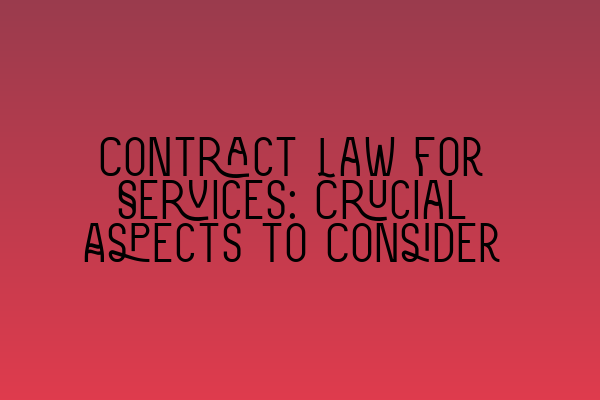Contract Law for Services: Crucial Aspects to Consider
In the world of business, contracts are an essential part of ensuring that both parties involved uphold their obligations and protect their rights. When it comes to providing services, it is crucial to have a solid contract in place that outlines all the necessary terms and conditions. In this blog post, we will explore the crucial aspects to consider when drafting a contract for services.
1. Clear and Concise Scope of Work:
One of the most important aspects of a service contract is defining the scope of work. This section should outline in detail the specific services to be provided, including any deadlines or milestones. By clearly defining the scope, both parties can avoid confusion and potential disputes down the line. For further insights into legal practice and decision-making, check out this article on Real-Life Case Studies: Insights into Legal Practice and Decision-Making.
2. Payment Terms and Conditions:
Another crucial aspect of a service contract is the payment terms and conditions. Clearly state the agreed-upon fee or rates, as well as any additional costs such as expenses or materials. Specify the payment schedule, whether it be a lump sum, hourly rate, or milestones. It’s essential to have a clear understanding of the payment terms to ensure both parties are satisfied. For further insights into solicitor salaries in the UK, check out this article on Solicitor Salaries in the UK: Average Earnings and Factors Affecting Income.
3. Duration and Termination:
Including a section on the duration and termination of the contract is vital. Specify the start and end date of the contract, and include any provisions for early termination by either party. Clearly outline the consequences or penalties for termination, such as any outstanding payments or compensation. It’s important to protect both parties in the event of contract termination.
4. Intellectual Property Rights:
If the services provided involve the creation of intellectual property, such as designs, software, or written content, it essential to address the ownership and usage rights in the contract. Specify who retains the intellectual property rights and if any licenses or permissions are granted. It’s crucial to protect your intellectual property and avoid any potential legal disputes in the future.
5. Confidentiality and Non-Disclosure:
In many service contracts, confidentiality and non-disclosure clauses are essential. Both parties should agree to keep any confidential information strictly confidential and not disclose it to third parties. Specify the duration of the confidentiality obligation and the consequences of any breaches. This helps protect sensitive information and trade secrets.
For further insights into client relationship management skills for solicitors to enhance trust and loyalty, check out this article on Mastering Client Relationship Management: Skills for Solicitors to Enhance Trust and Loyalty.
6. Dispute Resolution:
Even with a well-drafted contract, disputes can arise. Including a section on dispute resolution helps both parties navigate potential conflicts. Specify whether disputes will be resolved through mediation, arbitration, or litigation. It’s important to have a clear and agreed-upon process for resolving disputes to avoid unnecessary legal battles.
7. Governing Law and Jurisdiction:
Include a section that states the governing law and jurisdiction that will apply to the contract. This is especially important if the parties involved are in different countries or regions. Agreeing on the applicable law and jurisdiction can help streamline any potential legal proceedings.
In conclusion, when drafting a contract for services, it is crucial to consider the aforementioned aspects. By clearly defining the scope of work, specifying payment terms, addressing duration and termination, outlining intellectual property rights, including confidentiality clauses, and establishing a dispute resolution process, you can protect both parties and ensure a smooth working relationship. For further information on pursuing a law school education in the UK, check out this article on Pursuing a Law School Education in the UK: Choosing the Right Path for Your Future. Remember, a well-drafted contract is the foundation of a successful business arrangement. For assistance with contract law or securing training contracts, be sure to visit Securing Training Contracts: A Roadmap to Becoming a Solicitor.
